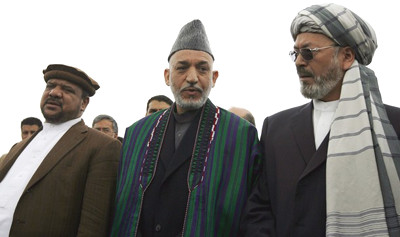GlobalPost, September 29, 2009
A hidden denial in the Afghan election
U.S. missteps in Afghanistan stretch back the the Bush administration's decision to court the warlords
By Paul Fitzgerald and Elizabeth Gould

AFP (Jun. 30, 2009): An Afghan rights watchdog on Tuesday slammed President Hamid Karzai's choice of two "notorious warlords" (Fahim left and Khalili right) for his August re-election bid and accused him of promising ministries to supporters. Both are believed to have links with illegal militia and criminal groups, it said, adding Karzai "has chosen two notorious warlords as his election mates in a bid to win votes from former mujahideen militias."
Human Rights Watch: "He [Fahim] is widely believed by many Afghans to be still involved in many illegal activities, including running armed militias, as well as giving cover to criminal gangs and drug traffickers."
The Afghan election results are finally in and, to no one's surprise, they have inflamed a crisis of credibility. Afghanistan’s latest effort in democracy was marred by widespread fraud, violence, and intimidation.
The U.N.-backed Independent Election Commission awarded President Hamid Karzai 54.6 percent of the vote, putting him over the critical 50 percent necessary to secure victory without a runoff. But with a third of Karzai’s 3.1 million votes facing an audit there is little chance the final decision will avoid a long and painful runoff election.
It is the worst of all possible outcomes and a staggering blow to President Obama’s Af-Pak war strategy. Experts estimate it will take the U.S. at least 12 to 18 months for signs of progress to show. Now, half of that time will be spent under a cloud of illegitimacy even if Karzai wins reelection.
It wasn’t supposed to be this way, but according to an Afghan human rights expert, Sima Wali, who represented King Zahir Shah at the Bonn conference in 2001, the process of building a new Afghanistan was doomed from the beginning. “During the debates establishing the post-Taliban government of Afghanistan in 2001, Islamist principles that had never been considered Afghan and were never a part of previous Afghan constitutions were infused into the new constitution. Many in leadership positions in the current government of Afghanistan also subscribe to extremist ideologies of the Islamic kind that were never part of Afghan politics.”
According to Afghanistan expert David B. Edwards, the extremist, anti-modernist ideologies of the Taliban and the seven major Peshawar mujahideen organizations were known to be as alien to Afghanistan’s traditional ideas of governance as anything introduced by foreign colonial powers.
From the founding of the modern Afghan state in the 1880s under Amir Abdur Rahman Khan to the period of Amir Amanullah Khan in the 1920s to the Marxist coup of 1978, Afghan politics exhibited a determination to both modernize and moderate Afghan society.
From David B. Edwards' book, "Before Taliban": "Abdur Rahman nevertheless forged the basis of governance in Afghanistan and the understandings that people have retained of the natural and proper duties, role and comportment of its leaders. Amanullah provides an illuminating secondary point of reference for this analysis because he anticipated many of the reforms that the Marxists would later try to put in place."
In addition to placing former Taliban madrassa students in positions of authority, the decision by the administration of George W. Bush to bring warlords into the tribal Loya Jirga that established the new government, had an irreversible effect.
...
A Pakistani journalist, Ahmed Rashid, wrote in his book "Descent Into Chaos" about a European diplomat’s shock at the American strategy. “ ‘Giving the warlords a front seat was a blow to the Afghans and a negative symbol of U.S. influence,’ said one ambassador.”
A Pakistani journalist, Ahmed Rashid, wrote in his book "Descent Into Chaos" about a European diplomat’s shock at the American strategy. “ ‘Giving the warlords a front seat was a blow to the Afghans and a negative symbol of U.S. influence,’ said one ambassador.”
Operating under the false assumption that warlords were always a fundamental aspect of governance in Afghanistan, few in the media or Washington policy establishment questioned the thinking behind such decisions. But the fatal moment arrived when the Bush administration made the unilateral decision to sideline the one person who could have pulled the country together after 30 years in exile, King Zahir Shah.
One commentator, William Pfaff, wrote: “Washington manipulated the Loya Jirga (national assembly of tribal leaders) called in June 2002, so as to put Karzai in office. This was despite the will of the majority of the assembly to bring back the royal family, and the ex-king, as nonpartisan and traditionally legitimate influences in the country’s affairs.”
As a gauge of legitimacy for an escalating American presence, the Afghan elections meant a great deal to Washington. The U.S. must now scramble to deal with a disintegrating political system in both Afghanistan and Pakistan, a worsening security situation and an increasing lack of credibility.
On Sept. 9, the Pakistani president, Asif Ali Zardari, outright rejected Af-Pak, stating: “Afghanistan and Pakistan are distinctly different countries that cannot be lumped together.”
In Afghanistan, a pre-election poll showed that at least 50 percent of Afghans don’t want Americans fighting their war either and want them to go home. In the U.S., polls indicate that 58 percent of adult Americans now say the war is not worth fighting.
Today, Washington faces up to an election process of its own making. But if the U.S. is trying to build a viable Afghan government by ignoring a major progressive theme in Afghan politics for over a century, it will be denying itself the last chance for success.
(Paul Fitzgerald and Elizabeth Gould are the authors of Invisible History: Afghanistan's Untold Story, available from City Lights Books.)
Characters Count: 7410
